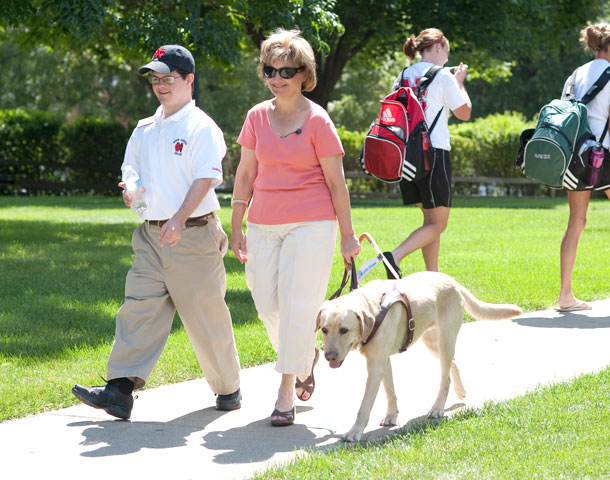Cindi Swanson Portrait
Cindi Swanson

Grocery shopping, getting to work, and taking kids to school can be a hassle for anyone. But when 56-year-old CINDI SWANSON lost her vision 15 years ago, she learned just how difficult these everyday tasks can be.
"When I started looking for transportation options, it was abysmal in the suburbs," says Cindi, who lives in the western suburbs.
Once her vision loss made it difficult to continue working as a journalist, she got a master's degree and became a certified social worker. Cindi has become a passionate advocate for planning and development that address the needs of all residents, including residents with disabilities.
Her 23-year-old son, who has Down's Syndrome, works within a mile of home so he can get there on foot. But development choices like the removal of a sidewalk for construction often ignore the needs of people with disabilities, Cindi says, making the commute harder or even unsafe.
"I want my son to go out and be engaged in the community," she says. "If you can't walk or it's too dangerous to walk, there's a lot of home sitting."
Her family moved from a subdivision to be closer to their town's central business district, with more amenities nearby. Even downtown, she can't easily run all her errands, though. "There's still no place to just buy a gallon of milk without having to get in a car," she says.
Cindi works with local planners and city officials who are trying to make it easier to get around her community. She invited many of them on a walk through theneighborhood to see how difficult it can be for people with special needs to navigate.
"I showed them how challenging it is to get around, and I try to show them that we aren't just talking about the blind, but people who want to age in place and stay in town," Cindi says. "We're also talking about the good soldiers who will be coming back home with disabilities."
To get places that aren't in walking distance, Cindi and her son use "Ride DuPage," which offers bus or taxi services for residents with physical or cognitive disabilities. Having helped develop the program with the DuPage Inter-Agency Paratransit Coordinating Council, she says it's a model that groups in Kane and Will counties are replicating.
"We don't just need to build the structure, we need to build a culture around this," Cindi says.
"Inclusion is more than just architecture, inclusion is also of the heart."
